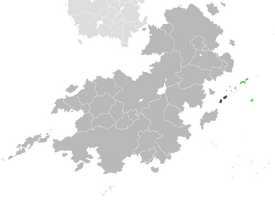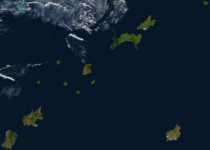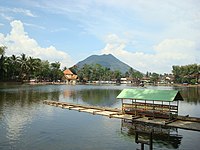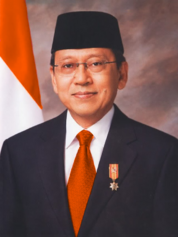South Kabu
This article is incomplete because it is pending further input from participants, or it is a work-in-progress by one author. Please comment on this article's talk page to share your input, comments and questions. Note: To contribute to this article, you may need to seek help from the author(s) of this page. |
Socialist Republic of Kabu Republik Sosialis Wong Kabupik (Kabuese) | |
|---|---|
| Motto: Persatuan, Merdika, Podo, Buruh "Unity, Freedom, Equality, Labour" | |
| Anthem: Ing Internasionale | |
 Land controlled by South Kabu shown in dark green; land claimed but uncontrolled shown in light green. | |
| Capital and largest city | Kutha Pamungkas |
| Official languages | Kabuese |
| Recognised regional languages | Masiorese |
| Demonym(s) | Kabuese • South Kabuese |
| Government | Unitary non-partisan socialist semi-presidential republic |
| Tirto Sutikno | |
• Premier | Eko Dhimas |
| Legislature | Congress of Kabu |
| Establishment | |
| 952 | |
| 1132 | |
| 1482 | |
| 1558 | |
| 1782 | |
• Declaration of the Socialist Republic of Kabu | 1941 |
| 1978 | |
• Current Constitution | 1994 |
| 2020 | |
| Area | |
• | 44,154 km2 (17,048 sq mi) |
| Population | |
• 2018 census | 7,841,984 |
• Density | 178/km2 (461.0/sq mi) |
| GDP (PPP) | estimate |
• Total | $101.459 billion |
• Per capita | $12,938 |
| GDP (nominal) | 2019 estimate |
• Total | $45.271 billion |
• Per capita | $5,773 |
| Gini (2020) | 23.1 low |
| HDI (2020) | high |
| Driving side | right |
| Calling code | +62 |
| Internet TLD | .ku |
South Kabu (Kabuese: Kabupik Kidul), officially the Socialist Republic of Kabu (Kabuese: Republik Sosialis Wong Kabupik) also known as the RSK, is a country in Southeast Coius constituting the southern part of the Kabuese Archipelago. The country shares a maritime border with North Kabu across the strait of TBD. Like it's Northern counterpart South Kabu claims the entirety of the Kabu Archipelago and the overseas territories of Kingsport and Nouvel Anglet of Estmere and Gaullica respectively. It has an area of 44,154km2 (17,048 sq mi) and a population of 7,841,984. The capital city of South Kabu is Kutha Pamungkas which is also the largest city in the Kabuese archipelago.
The southern portions of the Kabuese Archipelago have experienced continuous human inhabitation since approximately 432CE according to existing records and archaeological evidence of rice farming and human civilisation on Gedhe. During the 9th century the Kingdom of Agunglintang was influential in spreading Badist beliefs across the south of the archipelago through trade with Dezevau. The archipelago was unified under several kingdoms at various points in it's history although was finally conquered by the Aguda Empire in 1558 who centralised power in the newly created city of Vinhumavizia. The islands became particularly important to the global spice trade and were an important trading hub in the Brown Sea. The islands were eventually sold to the Kingdom of Estmere after the purchase of Pulau Hujung in 1778 and were consolidated into the Carolinian Islands Colony with the administrative centre of the colony being in Kutha Pamungkas.
Estmerish rule in the south collapsed in 1941 when Tirto Sutikno declared the Socialist Republic of Kabu (RSK), officially beginning the Kabu Civil War. Much of the south's rural and administrative centres including the capital were seized quickly by the Kabuese Section of the Workers' International (BKMI) aligned soldiers. The war ended in a stalemate between the Southern government and the Kabu Republic dividing the archipelago in two. The newly formed RSK was isolated from the non-councilist international community and faced severe economic problems owing to it's strict planned economy and isolation. The country experienced major political and social upheaval in and began the gradual transition to a semi-democratic system in 1978. The country's international isolation was ended in 1991 when the southern government was admitted to the Community of Nations. Since then South Kabu has experienced a period of considerable economic growth. Since 2020 the country has begun to adopt a fully-councilist system of government.
Today, South Kabu is seen as a developing country with a high HDI and low income inequality due to the Socialist economic system in the country which has been in place since the Kabu civil war. South Kabu has a fast growing economy although development has slowed slightly in recent years. South Kabu faces severe problems with Poverty, Corruption and ethnic tensions between the Kabuese Majority and the various minorities in the country. South Kabu is a member of the Association for International Socialism; the Brown Sea Community; the country has also established Diplomatic relations with numerous countries.
Etymology
History
Prehistory
Kingdoms of Kabu
Aguda control over the Kabuese archipelago
Estmerish colonisation
- Colonialism bad
Kabu civil war
- Gaullican occupation
- Failed attempt at a united government
- Battle of Kutha Pamungkas
- Course of the war
- Treaty of City
Socialist Republic of Kabu
- Authoritarian consolidation of power by the Kabuenom faction
- Long protracted insurgency with anti-communists
- Attempted coup against Sutikno Harjo
- 1968 South Kabuese student protests and crushing of the opposition
- Assassination of Sutikno Harjo and 1970 South Kabuese coup d'état
Democratisation and reform
- Transitional military government until 1978
- Ascendency of Prabowo Suryo and consolidation of authority
- Reproachment with North
- 1986 South Kabuese coup d'état attempt
- Suryo steps down & reformists seize power
- Party infighting and failure to deal with insurgency or implement a councilist government
- Tirto Sutikno & 2021 South Kabuese coup d'état
Geography
The Kabu Archipelago from space
- Area
- Number of Islands
- Mountains
- Rivers
- Lakes
- Caves
- Tallest and lowest points
Climate
- Weather
- Average temperature
- Seasonal changes
- Rate of precipitation
- Weather events
- Climate change
Biodiversity
- Animals native to South Kabu
- Endangered species
- National animal
- Flora
- National parks
- Conservation efforts
Environment
- Poaching and hunting
- Unexploded Kabu Civil war mines
- Use of herbicides
Government and Politics
South Kabu is a Unitary non-partisan socialist semi-presidential republic. Prior to 2022 the Kabuese Section of the Workers' International (BKMI) is the sole legal party in South Kabu. The BKMI was the dominant and governing party of South Kabu since the end of the Kabu civil war. Since 1985, South Kabu has liberalised some aspects of it's government however the party retains it's grasp on South Kabuese political society. As of 2020, close to 15% of eligible voters in South Kabu are registered members of the party. Since 2022 the party has not ran candidates in the Congress of Kabu and has effectively ceased being a political party in favour of being a political organisation in South Kabu.
The President is the head of state of the country and has executive powers and is the commander in chief of the South Kabuese military. The President of South Kabu is elected democratically every 5 years, there is no constitutional limit to how many terms a President can serve. Since the declaration of the Negara Darurat the office of President has been granted near dictatorial powers over South Kabu's government with the ability to dissolve parliament, remove government officials and the ability to veto bills. The President of South Kabu is also immune from prosecution whilst in office and becomes a Senator for life upon leaving office.
The Premier of South Kabu is the head of government of South Kabu and is appointed by the Congress of Kabu. The Premier represents South Kabu in foreign affairs and legislative affairs.
The Congress of Kabu (Kongres Kabupik) is the unicameral state legislature of South Kabu composed of 115 directly elected members. It was first elected in 2022 to replace the old partisan legislature and is a non-partisan body.
Administrative divisions
- Administrative districts map
- Changes in district borders
Wilayah Lor
- Brief description of claimed territory. N. Kabu, Kingsport, Nouvel Anglet
Military
- Kabuese People's Armed Forces
- Informal paramilitary use
- Military expenditure
- Human rights abuses and influence in politics
Foreign relations
- Kabu conflict
- Claimed territories
- Strained relations with East Euclea
- Relations with other socialist states
- Brown sea community membership
Human rights
According to a CN report published in 2013 says "Human rights in the Socialist Republic of Kabu are poor compared to it's counterparts in the Brown Sea area. There are reports confirmed by investigators of torture, kidnapping, forced disappearances and politically motivated murders that were conducted between 1950 and largely subsided in 1994. Despite this human rights abuses particularly in Masiora and in areas affected by the ongoing insurgency are extremely poor and reports of war crimes conducted by fighters in the area have been investigated." It is estimated that over 8,000 people were abducted and killed by security services between 1962 and 1993. In 2004, activist Eko Slamet was abducted at Kutha Pamungkas Airport before being tortured for several days and then murdered before his body was found off the coast of Kutha Pamungkas. South Kabu officially denies any state involvement in the death of Eko Slamet and blamed the murder on organised criminals.
Serious allegations of war crimes in Masiora and north-eastern Walantaka were confirmed by the CN in 2018 including rape, mass murder and the usage of child soldiers by anti-government militias and the Kabuese People's Armed Forces. On 17 October 2021 the CN released a report that "expressed serious concern at the rapidly declining human rights situation in Masiora which is being blockaded by government forces." A CN expert also warned of a devastating famine orchestrated by the South Kabuese government to starve the militias was likely if the international community did not act within months.
Economy
- Economy info
- Socialist economy
- Foreign aid
- Rural and Urban poverty
- Economic growth
Agriculture
- Primary crops grown
- % of economy focused on agriculture
Technology
- Science and technology
- Cooperation with AIS and BSC on science
Tourism
- Popular tourist destinations
- Tourism industry
- Promotion of tourism
Infrastructure
Transport
- Roads
- Ferries
- Rail transport
- Airports
- Kutha Pamungkas metro
- River transport
Energy
- State owned energy company
- Hydropower
- Solar power
- Gas power
- Power supply issues
Health
- Life expectancy
- Malnutrition
- Lack of healthcare in rural/isolated areas
Education
- Primary schools, middle schools & high schools
- Universities
- Education expansion post independence
- Allegations of indoctrination
Telecommunication
- Government sponsored telecommunication expansion
- Lack of telecommunication infrastructure in rural areas
- Internet access
Demographics
- Population pyramid
- Young average age
- Kabuese abroad
Urbanisation
- Growth of Kutha Pamungkas post independence
- Other cities
Languages
- Kabuese
- Mandated use of Kabuese over minority languages
- Masiorese
Religion
- Promotion of irreligion
- Move to tolerance of religion
- Current religious communities
Culture
- Literature
- Art
- Music
Cuisine
Media
- State media
- Newspapers
- Underground media
Sports

- S.Kabuese football team
- Other popular sports
- Traditional sports
Holidays and festivals
- Public holidays template










